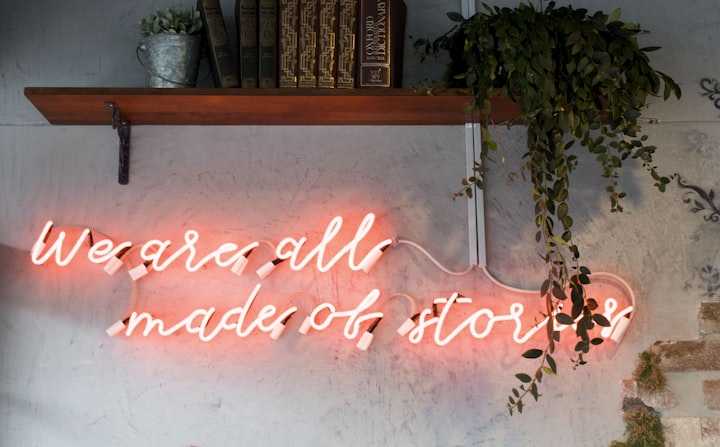Why I broke up with my mentally unwell friend
Our own mental health is our first responsibility

“Don’t set yourself on fire trying to keep others warm.” - Penny Reid.
You might think my story is shocking, and you might think I’m a bad friend, even a bad person. But that’s the point of this story. We are often so afraid of the judgment of others, that we stay in situations that hurt us for way too long.
We try to be a ‘good friend’, even to the detriment of our own well-being.
The story I’m going to share with you here is a reminder to look after your own mental health first. Yes, there are a lot of other people out there who need support. But you can’t pour from an empty cup. We must begin with ourselves.
If you choose to judge my choices then that’s your call. But I’m able to share this story now because with time I’ve managed to forgive myself. At least a bit…
Those first red flags
Lucy was an old friend from an old job I had in my early twenties. We are both hurtling towards forty now.
Three years ago around January time I received a Facebook message from Lucy, saying it was her New Year’s Resolution to reach out to old friends who she liked but had lost contact with.
She had liked me? Well that was flattering. To be honest, twenty-something me was an idiot. I couldn’t believe that anybody who remembered me from that time would want to talk to me now. Yet here was Lucy, extending the hand of friendship, so we started talking.
A little later in the year I agreed to travel up to Manchester from my home in London, to spend some time with her and have a good old catch up.
Stepping out of the train station and in to Lucy’s car, I saw my first red flag, which being me, I swiftly ignored.
Lucy made an offhand comment about how it was nice to see a friendly face because all her friends in the local area were shunning her, as her life has “too much drama.”
Internally, I kind of wanted to jump out of the car at the sight of this red flag in the corner of my eye. But that would have been weird, and I’d made a commitment to visit her.
So we hung out for a couple of days, me sleeping in one of her kids’ bedrooms. We did some fun stuff and for the most part it was nice.
The calm before the storm
A little time passed, and we became casual friends, sometimes chatting on Skype or messenger. Nothing too intense, and things were mostly good. As I have a keen interest in mental health and make no secret of my journey with depression, she was quick to tell me about her mental health condition. It was a good bonding point for us.
Lucy has a personality disorder… and this is where I most fear the judgment of others. I broke up with a friend who has such a difficult condition. And it truly is a tough one.
As is the case for many people with this sort of disorder, she struggles with maintaining friendships, knowing where the boundaries are, and with her anxiety around being abandoned.
It’s a sad fact of life that the more we crave love and closeness, the more we manage to scare others away.
But with a condition like Lucy’s, this fact is just one part of complex problem that overshadows her whole life.
Are you judging me yet? I was, and this is why I stayed with her for as long as I did. It’s also why it’s taken me so long to come to terms with my choices and write about them.
It got weird
I knew our friendship was becoming unhealthy. Initially we had bonded over our mutually bad childhoods, and our fascination in all things psychology.
But the dynamic changed, and I was starting to feel stressed by her increasingly leaning on me. Each time I picked up my phone, I would worry what I’d have in my inbox next.
I was starting to see what her local friends were talking about with the ‘drama’, and to be honest, I wanted space from her. But equally, I was aware of how her condition means that abandonment of any kind will send her on a downward spiral.
This was my second red flag — but this time it was about my behavior as much as hers. I was facilitating her leaning too hard on me, as I was too scared to put boundaries in place in case I upset her.
The ‘Event’
The big event, the crescendo of all of this building tension, came towards the end of the year, when she asked if she could come and stay the night.
It was a simple request — she was working in London for the day, and rather than travel home after work, she wanted to rest up here and hang out at the same time. Maybe it would do her good to get a night away from her husband too — but that was only mentioned as more of a secondary gain — not the real reason she wanted to stay with me.
Of course, I said yes to this perfectly reasonable request.
I wasn’t ready for what came next.
Lucy’s arrival was shortly followed by a visit from the police, as Lucy’s husband had notified them she was a missing vulnerable person.
At first Lucy told me a string of lies about what was really happening. But as it transpired, she had stopped taking her medication days ago. Plus she had called her husband to threaten suicide, and then gone on a bit of a rampage.
She ended up spending two nights and two days on my sofa, barely moving but to reach for her phone. I could tell she knew she was outstaying her welcome.
My partner and I live in a very small one-bedroom house, with me trying to work from home in the bedroom, and my partner working shifts and needing to sleep while I worked. An emotionally unstable person controlling our living space and causing the police to turn up was not sustainable for us.
But because she knew she was outstaying her welcome, and feeling rejected is like lighting her fuse, things got even worse. I hadn’t asked her to leave, again I was too cowardly to do so knowing her condition. But I had strongly suggested some other friends she could stay with while taking a break from her husband.
Of course, she smelt rejection. She was highly attuned to it.
She packed up, told me she was heading to one of those friends, and said a very sensible-seeming goodbye. I thought things were okay.
Two hours later she was a missing person again. It transpired that she had gone on a drink and prescription drug-fuelled bender, made another suicide-threat to her husband, and ended up in our local hospital, where she had somehow taken herself in a moment of clarity.
So the police were back at my house, the third visit now, and wanted to take me to her. Apparently she was asking for me at the hospital and refused to talk to anyone else.
Two lovely officers and I spent the night watching her so she couldn’t check herself out of the ward, which would have resulted in her being sectioned. Our goal was the gentler option of her going to a psychiatric hospital voluntarily in the morning, so she wouldn’t lose her rights or access to her kids for that period of time.
After the hospital
Lucy recovered well, claiming to have no memory of that whole period. If I’m honest, I kind of wanted an apology. But maybe that’s wrong of me. What I can tell you from my side of things is that it was extremely stressful for my partner and I, and we felt emotionally drained.
Between you and me, that experience of her suicidal behavior and my guilt at triggering it by not wanting her to keep staying at my house was not great for my own mental health.
I was now back on my anti-depressants that I had previously worked so hard to get off, and my anxiety had become a daily struggle again.
I’m not blaming her for affecting me — or at least I’m trying not to. I don’t want to be that person, and I know that we are each responsible for ourselves. But honestly, I wished I’d never responded to that initial Facebook message the year before.
This friendship was doing me more harm than good . This left me doing battle with my conscience about my selfish desire to live a peaceful life.
As I write this now, it’s still a battle in my head. On the one hand, I know I deserve to be happy and live peacefully. But on the other, I can’t shake off the guilt I feel, or the societal pressure to set myself on fire to keep my poor, mentally unwell friend warm.
But being a complex human with my own flaws, which include being rubbish at setting boundaries, and worrying about the judgment of others, I carried on the friendship. After all, what kind of a**hole ditches a friend right after a mental breakdown?
So once she was recovered we hung out again, and apart from my quiet resentment at the lack of apology, it was pretty nice. We had fun and talked about more positive things. I was hopeful that her mental health had turned a corner, and we could be ‘normal’ girlfriends, like those happy people you see on TV…
Relapse
Faster than you could say, “I told you so” — it starting going wrong again.
This time it was Lucy’s husband who contacted me first. She was going off the rails again, he said, and the stress was making her youngest daughter have panic attacks.
He begged me to speak to her, as she “listens to me”…
Where did he get that idea? I was really worried that rather than listen to reason, she would once again end up on my sofa, bringing a string of police visits and stress that frankly, I wasn’t all that equipped to deal with.
The beginning of the end
What started with some reasonable (but slightly cowardly on my part) conversations via Facebook messenger, ended with me taking the no contact approach.
She just wasn’t listening to me, or telling me the whole truth. I’d hear one thing from her, and another from her husband, and it was making me crazy.
There wasn’t any breaking the cycle that I could find — asking reasonably for space for my own mental health wasn’t getting me heard.
I simply did not know how to get through to somebody in this mindset — I am not a psychiatrist.
What I did know was that I couldn’t be in the middle anymore. I wasn’t helping her; I was simply enabling her for short periods of time, and then retreating into my own depressed bubble when it all got too much.
This January, around the time of the ‘Event’ two years ago, I thought about her again. I still feel guilt for how I handled things. But I also feel glad that I broke our friendship off when I did. It was toxic for both of us.
So I definitely can’t tell you how to help a friend in a similar position to Lucy, other than to bring in the professionals as soon as possible.
Personality disorders are extremely complex, and while we might have good intentions, we can easily make things worse. I know that my fear of making things worse, actually did make things worse.
By avoiding the hard conversations early on, and ‘going along with things’ to keep the peace, I had become an enabler. That’s probably why she ended up on my sofa not knowing what to do next.
But what I can tell you is that while you might fall into the trap of feeling responsible for your friends, you are not.
We are each responsible for our own mental hygiene first and foremost. You can’t help somebody climb out of a pit if you fall in trying to reach them.
So instead of over-reaching past your zone of ability, step back and sound the alarm. It’s not selfish to be honest and admit when you’ve strayed out of your depth.
Above all, focus on keeping yourself mentally healthy. If you have a friend that you think needs proper help, then speak to a trained expert.
About the Creator
Sarah K Brandis
Mental health, psychology and neuroscience writer. Survivor. Author of The Musings of an Elective Orphan. www.sarahkbrandisauthor.com






Comments
There are no comments for this story
Be the first to respond and start the conversation.